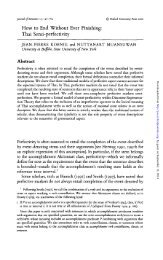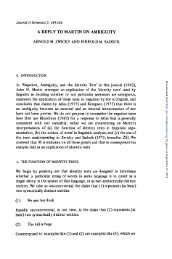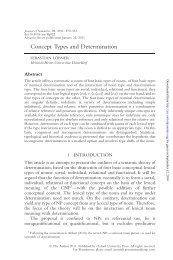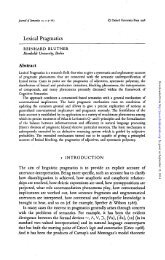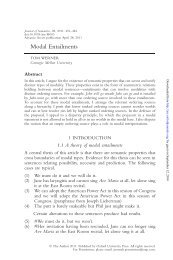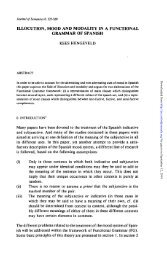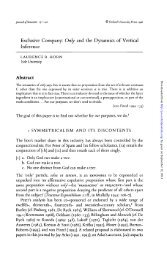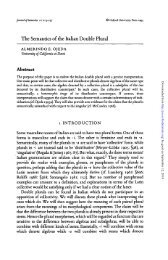Aspectual Coercion and Logical Polysemy - Journal of Semantics
Aspectual Coercion and Logical Polysemy - Journal of Semantics
Aspectual Coercion and Logical Polysemy - Journal of Semantics
You also want an ePaper? Increase the reach of your titles
YUMPU automatically turns print PDFs into web optimized ePapers that Google loves.
152 <strong>Aspectual</strong> <strong>Coercion</strong> <strong>and</strong> <strong>Logical</strong> <strong>Polysemy</strong><br />
NP<br />
lex Marie<br />
|_TYPE ind_<br />
NP<br />
lex le-livre<br />
TYPE ind<br />
Let us now return to the discussion <strong>of</strong> raising constructions <strong>and</strong> coercion in<br />
such structures. We observed in sentence (6a) that type coercion is unacceptable<br />
with this predicate:<br />
(6) a. "L'acide commence le mabre. [corroding)<br />
The acid is beginning the marble.<br />
There would appear to be a possible derivation involving type coercion in this<br />
sentence where we choose the raising sense <strong>of</strong> commencer, imposing the type ef<br />
on the complement. But notice that coercion will be successful only if the<br />
appropriate type exists in the alias set <strong>of</strong> the complement. Metonymic<br />
reconstruction on the complement in (6a) returns an eventual function <strong>of</strong> type<br />
(e, e 7 } rather than the type selected by the verb, £°. Since function composition<br />
is an operation at the level <strong>of</strong> the VP, there is no point in the derivation at which<br />
the appropriate type is available for the rule to apply, <strong>and</strong> the sentence is not<br />
semantically well-formed. As we saw above, this is not the case with control<br />
verbs.<br />
Having outlined the basic mechanism <strong>of</strong> coercion under constraints, we can<br />
explain now why examples like (47) are ungrammatical.<br />
Downloaded from http://jos.oxfordjournals.org/ by guest on September 12, 2014<br />
(47) a. *Marie a commence l'autoroute. (driving on)<br />
*Mary began the highway.<br />
b. *Jean a commence le dictionnaire. (consulting)<br />
"John began the dictionary.<br />
c. "Jean a commence le sommet. (reaching)<br />
"John began the top <strong>of</strong> the mountain.<br />
d. *Jean a commence la symphonic (listening to)<br />
*John began the symphony.



